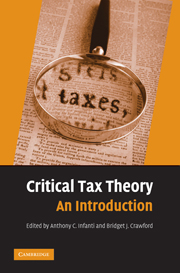Book contents
- Frontmatter
- Contents
- List of Illustrations
- List of Tables
- List of Contributors
- List of Common Abbreviations
- Introduction
- CHAPTER 1 FOUNDATIONS OF CRITICAL TAX THEORY
- CHAPTER 2 HISTORICAL PERSPECTIVES ON TAXATION
- CHAPTER 3 THE GOALS OF TAX POLICY
- CHAPTER 4 CRITICAL TAX THEORY MEETS PRACTICE
- CHAPTER 5 RACE AND TAXATION
- CHAPTER 6 GENDER AND TAXATION
- CHAPTER 7 SEXUAL ORIENTATION AND TAXATION
- CHAPTER 8 THE FAMILY AND TAXATION
- CHAPTER 9 CLASS AND TAXATION
- CHAPTER 10 DISABILITY AND TAXATION
- CHAPTER 11 GLOBAL CRITICAL PERSPECTIVES ON TAXATION
- Toward a Global Critical Feminist Vision: Domestic Work and the Nanny Tax Debate
- The Taxation of Undocumented Immigrants: Separate, Unequal, and Without Representation
- Prying Open the Closet Door: The Defense of Marriage Act and Tax Treaties
- Missing Africa: Should U.S. International Tax Rules Accommodate Investment in Developing Countries?
- Global Trajectories of Tax Reform: The Discourse of Tax Reform in Developing and Transition Countries
- CHAPTER 12 CRITICAL PERSPECTIVES ON CRITICAL TAX THEORY
- Index
The Taxation of Undocumented Immigrants: Separate, Unequal, and Without Representation
Published online by Cambridge University Press: 04 August 2010
- Frontmatter
- Contents
- List of Illustrations
- List of Tables
- List of Contributors
- List of Common Abbreviations
- Introduction
- CHAPTER 1 FOUNDATIONS OF CRITICAL TAX THEORY
- CHAPTER 2 HISTORICAL PERSPECTIVES ON TAXATION
- CHAPTER 3 THE GOALS OF TAX POLICY
- CHAPTER 4 CRITICAL TAX THEORY MEETS PRACTICE
- CHAPTER 5 RACE AND TAXATION
- CHAPTER 6 GENDER AND TAXATION
- CHAPTER 7 SEXUAL ORIENTATION AND TAXATION
- CHAPTER 8 THE FAMILY AND TAXATION
- CHAPTER 9 CLASS AND TAXATION
- CHAPTER 10 DISABILITY AND TAXATION
- CHAPTER 11 GLOBAL CRITICAL PERSPECTIVES ON TAXATION
- Toward a Global Critical Feminist Vision: Domestic Work and the Nanny Tax Debate
- The Taxation of Undocumented Immigrants: Separate, Unequal, and Without Representation
- Prying Open the Closet Door: The Defense of Marriage Act and Tax Treaties
- Missing Africa: Should U.S. International Tax Rules Accommodate Investment in Developing Countries?
- Global Trajectories of Tax Reform: The Discourse of Tax Reform in Developing and Transition Countries
- CHAPTER 12 CRITICAL PERSPECTIVES ON CRITICAL TAX THEORY
- Index
Summary
Undocumented immigrants, like all citizens and residents of the United States, are required to pay taxes. Despite the historic and strong American opposition to taxation without representation, undocumented immigrants (except in rare cases) have not enjoyed the right to vote on any local, state, or federal tax or other matter for almost eighty years. Nevertheless, each year undocumented immigrants add billions of dollars in sales, excise, property, income, and payroll taxes, including Social Security, Medicare, and unemployment taxes, to federal, state, and local coffers. Hundreds of thousands of undocumented immigrants go out of their way to file annual federal and state income tax returns.
Yet undocumented immigrants are barred from almost all government benefits, including food stamps, Temporary Assistance for Needy Families, Medicaid, federal housing programs, Supplemental Security Income, Unemployment Insurance, Social Security, Medicare, and the earned income tax credit (EITC). Generally, the only benefits federally required for undocumented immigrants are emergency medical care, subject to financial and category eligibility, and elementary and secondary public education. Many undocumented immigrants will not even access these few critical government services because of their ever-present fear of government officials and deportation.
RESIDENT ALIEN VERSUS NONRESIDENT ALIEN CLASSIFICATION
If a non–U.S. citizen is a U.S. resident, under the Code, she will be characterized as a “resident alien” for tax purposes. A resident alien is subject to the same income [tax], employment tax, and tax withholding laws as a U.S. citizen. Accordingly, a resident alien is subject to federal income tax on her worldwide income regardless of its source.
- Type
- Chapter
- Information
- Critical Tax TheoryAn Introduction, pp. 334 - 340Publisher: Cambridge University PressPrint publication year: 2009
- 1
- Cited by

